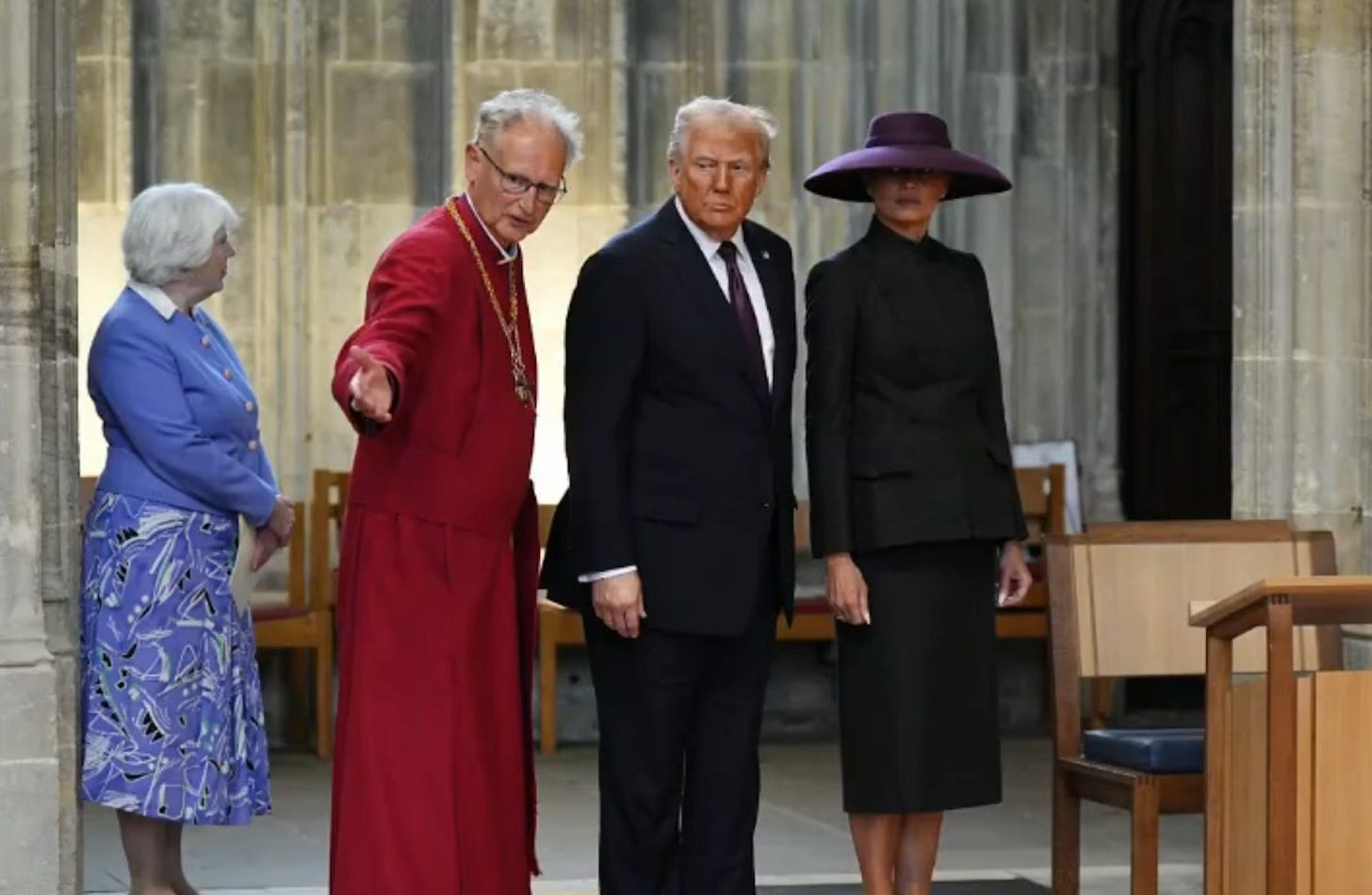The Special Relationship's Pomp and Peril
Trump's Windsor State Visit: Royal Tributes, Tech Handshakes, and Protests Signal a New Low in the Fractured Alliance
As autumn winds sweep through the ancient grounds of Windsor Castle, the transatlantic bond that once defined post-war stability now feels like a relic under siege—torn between ceremonial splendor and the harsh realities of shifting power dynamics, from AI-fueled tech pacts that favor the few to protests decrying Trump's shadow ties, all while Britain grapples with its post-Brexit isolation in a world where old loyalties are tested by tariffs, tariffs, and the specter of American retrenchment:
Windsor's Regal Arrival and Beating Retreat Ceremony: President Trump and First Lady Melania arrived at Windsor Castle—selected over the renovating Buckingham Palace—for a state visit steeped in tradition, featuring a Guard of Honor inspection and a horse-drawn carriage ride with King Charles III, Queen Camilla, Prince William, and Kate Middleton; the afternoon unfolded on the East Lawn with the Beating Retreat ceremony, where U.S. and British military bands performed for invited families, evoking centuries of shared history at a site of ancient military significance overlooking the River Thames, blending transatlantic symbolism in a display of meticulously choreographed pomp that highlighted the enduring allure of royal pageantry.
Intimate Tribute at St. George's Chapel: In a more private interlude, the Trumps were guided by the Right Reverend Christopher Cocksworth, Dean of Windsor, and Canon Charlotte Mailey through St. George's Chapel, where they laid a wreath at the tomb of Queen Elizabeth II, Prince Philip, King George VI, and Queen Elizabeth the Queen Mother in the George VI Chantry Chapel—a gesture that honored the transatlantic legacy and underscored Trump's professed Anglophile affections, complete with joining a choir hymn of "Gloria in Excelsis Deo" and sharing lighthearted moments and laughs with young singers, captured in official photos that contrasted the solemn reverence with the visit's underlying tensions.
Protests and Moral Clashes Outside the Walls: Yet the grandeur was sharply undercut by external tumult, as thousands protested in London and activists projected a massive 4,300-square-foot banner linking Trump to Jeffrey Epstein onto the castle walls, leading to arrests and amplifying accusations of moral compromise; this clash illustrated how the visit's nods to historical reverence collided with present-day controversies, where public disillusionment over Trump's associations threatened to overshadow the ceremonial unity and memory of Queen Elizabeth exposing the divisive undercurrents in U.S.-UK relations.
AI and Tech Partnerships in Focus: Beneath the pageantry, Prime Minister Keir Starmer and Trump announced AI and technology partnerships, joined by CEOs for deals on data centers and infrastructure, positioning the UK as a "more flexible and nimble" ally than the regulation-bound EU to attract U.S. investments that could provide American tech giants with a regulatory-light gateway to Europe, while offering reciprocal economic boosts to Britain amid its post-Brexit vulnerabilities and aiming for a win-win in cutting-edge innovation.
NATO Security Discussions and Defense Imperatives: Security talks reinforced NATO's imperative for allies to "do more" on defense spending, with the UK hailed as a vital partner in countering Russian aggression in Ukraine and facilitating America's strategic pivot toward China and the Indo-Pacific, allowing the U.S. to potentially reduce its European commitments without full withdrawal, though this highlighted the transactional nature of the alliance where Britain's contributions serve to enable American retrenchment.
Dashed Hopes on Tariffs and Zero-Sum Mindset: However, expectations for tariff relief on the beleaguered British steel industry were tempered and ultimately dashed, reflecting Trump's zero-sum approach rooted in his real estate background, where multilateral arrangements like NATO are often dismissed as "rip-offs" for the U.S., leaving British workers to suffer as deals prioritize enriching Silicon Valley elites and Trump's inner circle over equitable trade and long-term alliance stability.
Trump's Pullback from Europe: As Trump signals a retreat from EU entanglements to prioritize domestic issues like economic pressures and global flashpoints such as Gaza, the UK finds itself adrift in a "special relationship" characterized by stark asymmetry, where Britain's heavy dependence on America for technology and security remains largely unreciprocated, raising concerns about its strategic positioning in a shifting global order.
Expert Warnings of Alliance Shifts: Experts like Dr. Leslie Vinjamuri highlight "deep uncertainty," warning that this dynamic could mark "the beginning of a real shift" in alliances, as the UK's vulnerabilities are exposed without mutual reciprocity, prompting calls for greater European resilience to counterbalance potential U.S. disengagement.
Starmer's Strategy and Risks of Isolation: Starmer's approach of leveraging royal pomp to influence Trump on tariffs and geopolitics carries risks of further isolation unless Europe steps up to rebuild independent partnerships, underscoring how the visit's visual majesty belies the fragility of bonds reliant on symbolism rather than substantive equity.
Exposed Fragility and Call for Reevaluation: Ultimately, the event exposes the precariousness of transatlantic ties built on gilded promises over genuine empathy, with protests amplifying public disillusionment and urging a reevaluation of alliances in an era where partner considerations appear increasingly optional and absent.
Today's events at Windsor—majestic yet marred by protests—encapsulate a partnership at a crossroads. Trump's wreath-laying honors history, but the future depends on whether tech deals and security pacts deliver mutual gains or expose Britain's vulnerabilities in a Trump-led world order. As Epstein shadows linger and tariffs loom, this visit may signal not just continuity, but profound change—a realization that the governance of the country is not able to take care of itself, which is why the royals and the church become so important, and why the tomb of Queen Elizabeth became pivotal for the transatlantic legacy. What lies ahead for the "special relationship"? We are hoping the pomp and peril will do the trick.

